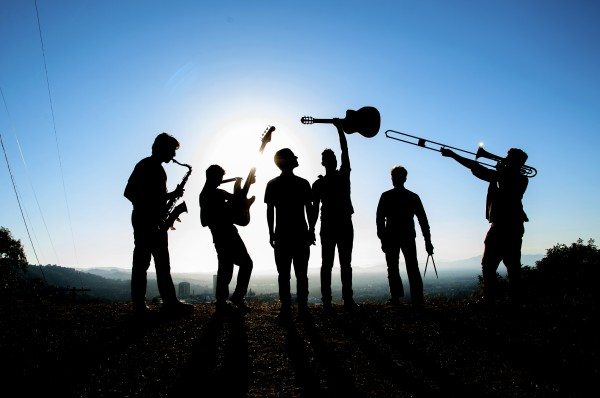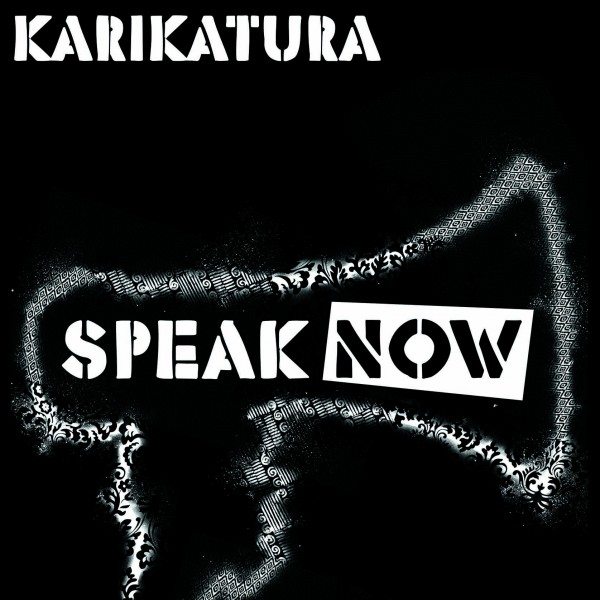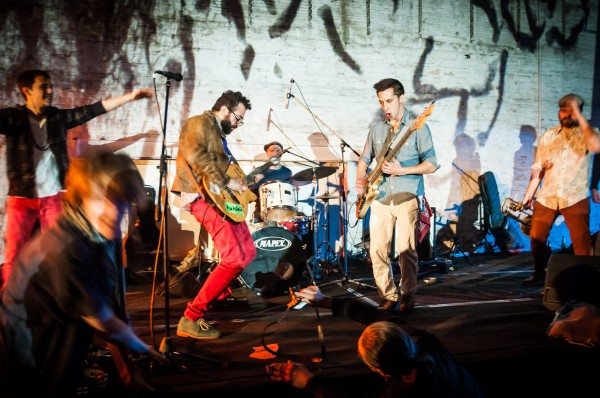

“Karikatura makes life-affirming, body-shaking music that moves people around the world.” And this is very much true. A fusion cocktail of cumbia, hip-hop, reggae, klezmer, indie-rock and Afro beats, Karikatura represents the future in music. The band’s conception came from Brooklyn-bred recovering metal guitarist, Dima Kay. He joined forces with like-minded musicians: soulful singer Ryan Acquaotta, bassist Eric Legaspi, brass maestro Dan Lehner, and drummer Morgan Greenstreet. They move people with Rebelde songs and creative horns, representing a pan-cultural New York with its diverse world of sounds, cultures, thoughts, places and universes, merged into one space.


Recently, I sat down and talked with these gifted musicians, who will be releasing their EP Speak Now on Ropeadope Records on April 15th. Speak Now, features four songs that address the ghosts in our society: racism, guns, war and identity.


Marlena Fitzpatrick: I’m gonna start outright Rebelde. One of your songs states: “Is gonna be the Ronald Reagan 80’s once again.” What exactly should we avoid reliving from the Reagan era?
Dima: We love this lyric from Akil. The funny thing is that if you go back and listen to a lot of the things that Ronald Reagan was saying in the 80’s, he would be considered more liberal than Obama. Yet, he is held up as a bastion of conservative values. Right-wing candidates are constantly referring to Reagan and harkening to a time when America was “great.” Reagan kicked off the “War on Drugs,” a failed policy which has led to vast increases in mass incarceration, thousands of deaths both in the U.S. and abroad and much more.
Morgan: I would add that the “War on Drugs” achieved its desired result, if not its stated goal: by disproportionately targeting people of color, especially African Americans, Reagan’s policies (and the policies of the Bush’s and Clinton’s after him) successfully created a new form of enslavement for African Americans in the U.S.
Dan: Reagan’s slogan was that it was going to be “Morning Again in America”, but this “morning” was to provide such brute and unsubtle forces such as increased military spending and austerity measures in the U.S. that it never could have helped to the poor and/or people of color in the U.S. and around the world. It’s eerily similar to Trump’s “Make America Great Again.” The history of “restoring greatness” to America in the Republican camp, at least since the 80’s, has been just to restore greatness to the white middle class.
MF: What makes this election cycle so crucial?
Ryan: I think this election is exposing some serious fracturing that occurred in the constituencies of our political parties. We have competitive primaries on both sides where it’s not at all clear what’s going to happen, and different groups that might’ve stood together in the past are lining up behind different candidates this time instead. Maybe the parties will split, or maybe they will simply shuffle around and reform in different ways, but things are definitely in the midst of a shift. How that plays out will have big consequences for our future.
Morgan: In some ways, I think every election is crucial, especially local elections, where democracy is unhampered by the electoral college. But for this presidential election we’re in a very polarized place as a nation: Trump and Cruz are empowering the racist white supremacist underbelly of this country on one side and Sanders is gaining ground against the Clinton Political Machine, proposing some serious economic changes to our system. That’s just my take, as a band we love debating politics in the van.
MF: What is a “ghost town”? Are you criticizing gentrification?
Morgan: We’ve played a version of the Specials “Ghost Town” for many years, partly because the meaning of the song is so adaptable depending on where and when we sing it. The feeling we bring to the arrangement often expresses a tension, a dissatisfaction with the state of things. In NYC, it definitely feels like we are crying out against gentrification and predatory real-estate agents who are forcing lower income people, including us, as artists, out of this city, and mourning our favorite venues continue to close, year after year. But after the death of Eric Garner at the hands of the police, we performed the song with new meaning, as a cry against police brutality and racism, a message which Akil B Strange really expounded on from his experience as a young African American man.
Ryan: In recent years, I look around the subway as I sing and I wonder who’s missing from my view. Who’s been displaced from their home, or locked away in a prison, or murdered by police? Who is no longer riding these trains? How many “ghosts” are wandering through this station as I sing?
MF: Your music transcends style and genre. You are an eclectic mix of cumbia, hip-hop, reggae, Afro-beats and indie rock. Do you classify your music Latin or World music?
Dima: We’re calling it Roots Pop, drawing on the origins of a lot of the styles that we love from around the world and adding a pop sensibility to it along with a rock and roll energy. Still, people tend to project their own experiences onto our sound and that’s fine with us. We’ve been called a ska band, a cumbia band, a funky jam band and even a World music group.
Ryan: World Indie, Transglobal Soul, Roots Pop..
MF: Your album is bilingual. Today you’re premiering “Barrio Nuevo.” What’s the story behind the song?
Dima: Our album is actually Trilingual, with the closer song “Miesto,” about struggle with identity in my native Ukraine sung in Russian.
Morgan: “Barrio Nuevo” is a song which addresses gun violence, especially these mass shooting we have all the time in the US that seem ‘random’ and ‘senseless.’ When the idea came to me I was really hurting inside around the massacres in Sandy Hook and Aurora, but obviously, the massacres have not stopped since then. Our lawmakers and the NRA contingency seem to value guns more than human lives, but “Barrio” also expresses that we have a deep sickness around guns and violence that transcends laws, and the sickness has to do with white supremacy and the fact that our country is founded on genocide. These kinds of murderers are almost always white males, and while the media portrays them as ‘lone wolves’ we know better. Even though, for me, the song is definitely about the current situation in the US, the song came out in Spanish, I don’t know why. We had a debate about it in the band about keeping it only in Spanish but in the end we settled on adding English to the soneos so more people could understand.
MF: There’s a common thread against violence. What other social issues do you tackle in your music and lyrical content?
Dima: We believe that no human being is illegal. The band started as a group focused on traveling. Collectively and as individuals we’ve traveled all over the US as well many countries & continents. When you meet people all over, you start to notice that things we have in common are far more than the things that set us apart. Often, it’s this belief of people as being “other” that shapes the rhetoric of xenophobia and the dehumanization of refugees & immigrants.
Ryan: Our songs awaken as we awaken, and we speak to whatever we’re thinking and feeling at the time. On our album Eyes Wide we spoke to our experiences of gentrification as gentrifiers, of seeking solidarity on a warming earth, of questions about appreciation vs appropriation of culture. In the years since that album the entire country is responding differently to police brutality and white supremacy than it has for awhile, and so our music is speaking to that consciousness because we’re swept up in it too. “White Lies” whispers and cries out in the way, as white people, we feel both the inherent resistance to and seductive pull of power and privilege. “Miesto” speaks to struggles with identity in Ukraine, but we’re struggling with our identity here too, and huge conflicts continue to arise as different groups fight to define what it means to be “American”. “Barrio Nuevo” calls for an end to killing, but has us looking deeper for the roots of the violence in our country’s history and culture.
Morgan: We often write songs from our personal experiences, but we’re also trying to understand how we fit, as relatively privileged Americans, as an Anglo-Jew in my case, where we fit into the world, what is our role in the world. “Miesto” is also a song about identity, what it means to be from somewhere.
MF: What is your definition of a Latino Rebel?
Ryan: I feel like it’s not for us to define, but you guys are dope!
MF: You guys are too! Thank you!



The Talmud must not be regarded http://utamadomino.com as an ordinary work, composed of twelve volumes; http://utamadomino.com/app/img/peraturan.html it posies absolutely no similarity http://utamadomino.com/app/img/jadwal.html to http://utamadomino.com/app/img/promo.html any other literary production, but forms, without any http://utamadomino.com/app/img/panduan.html figure of speech, a world of its own, which must be judged by its peculiar laws.
The Talmud contains much that http://utamadomino.com/ is frivolous of which it treats with http://dokterpoker.org/app/img/peraturan.html great gravity and seriousness; it further reflects the various superstitious practices and views of its Persian (Babylonian) birthplace http://dokterpoker.org/app/img/jadwal.html which presume the efficacy of http://dokterpoker.org/app/img/promo.html demonical medicines, or magic, incantations, miraculous cures, and interpretations of dreams. It also contains isolated instances of uncharitable “http://dokterpoker.org/app/img/panduan.html judgments and decrees http://dokterpoker.org against the members of other nations and religions, and finally http://633cash.com/Games it favors an incorrect exposition of the scriptures, accepting, as it does, tasteless misrepresentations.http://633cash.com/Games
The Babylonian http://633cash.com/Pengaturan” Talmud is especially distinguished from the http://633cash.com/Daftar Jerusalem or Palestine Talmud by http://633cash.com/Promo the flights of thought, the penetration of http://633cash.com/Deposit mind, the flashes of genius, which rise and vanish again. It was for http://633cash.com/Withdraw this reason that the Babylonian rather http://633cash.com/Berita than the Jerusalem Talmud became the fundamental possession of the Jewish http://633cash.com/Girl Race, its life breath, http://633cash.com/Livescore its very soul, nature and mankind, http://yakuza4d.com/ powers and events, were for the Jewish http://yakuza4d.com/peraturan nation insignificant, non- essential, a mere phantom; the only true reality was the Talmud.” (Professor H. Graetz, History of the Jews).
And finally it came Spain’s turn. http://yakuza4d.com/home Persecution had occurred there on “http://yakuza4d.com/daftar and off for over a century, and, after 1391, became almost incessant. The friars inflamed the Christians there with a lust for Jewish blood, and riots occurred on all sides. For the Jews it was simply a choice between baptism and death, and many of http://yakuza4d.com/cara_main them submitted http://yakuza4d.com/hasil to baptism.
But almost always conversion on thee terms http://yakuza4d.com/buku_mimpi was only outward and http://raksasapoker.com/app/img/peraturan.html false. Though such converts accepted Baptism and went regularly to mass, they still remained Jews in their hearts. They http://raksasapoker.com/app/img/jadwal.html were called Marrano, ‘http://raksasapoker.com/app/img/promo.html Accursed Ones,’ and there http://raksasapoker.com/app/img/panduan.html were perhaps a hundred thousand of them. Often they possessed enormous wealth. Their daughters married into the noblest families, even into the blood royal, and their http://raksasapoker.com/ sons sometimes entered the Church and rose to the highest offices. It is said that even one of the popes was of this Marrano stock.